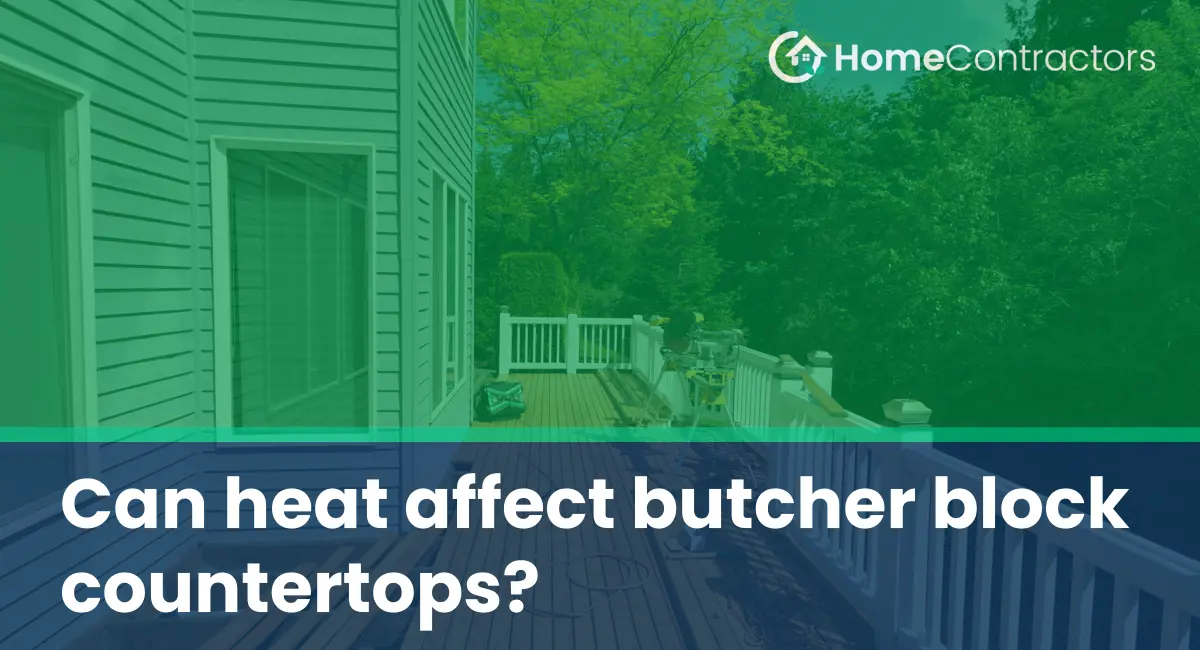Butcher block countertops have been a popular choice for many homeowners due to their warmth, natural beauty, and durability. However, one question that often arises is whether heat can affect these countertops. In this article, we will explore the potential impact of heat on butcher block countertops and discuss ways to protect and maintain them.
Understanding Butcher Block Countertops
Before delving into the effects of heat on butcher block countertops, it is essential to understand their composition. Butcher block countertops are made by sandwiching together strips of wood, most commonly maple, to create a thick, solid surface. The wood strips are glued together, forming a sturdy and visually appealing countertop.
Heat and Butcher Block Countertops
While butcher block countertops are generally heat-resistant, they can be sensitive to extreme temperatures and prolonged exposure to heat. Direct heat, such as placing hot pots, pans, or other cookware directly on the surface, can cause damage to the wood.
Effects of Heat on Butcher Block Countertops
1. Burn Marks:
Exposing a butcher block countertop to high temperatures can result in burn marks on the surface. These burn marks may darken the wood, causing discoloration and affecting the overall aesthetic appeal of the countertop.
2. Warping:
Prolonged exposure to heat or extreme temperature changes can cause butcher block countertops to warp. This happens when the moisture within the wood evaporates unevenly, leading to uneven stress distribution and altering the shape of the countertop.
Preventing Heat Damage
To maintain the integrity and beauty of your butcher block countertops, it is crucial to take preventive measures to avoid heat-related issues. The following are some practical steps you can take:
1. Use Trivets or Hot Pads:
Always use trivets or hot pads when placing hot cookware on your butcher block countertops. These heat-resistant materials create a protective barrier between the hot objects and the wood surface, preventing direct contact and potential heat damage.
2. Avoid Excessive Heat Exposure:
Try to avoid leaving hot pots, pans, or other heated objects on your butcher block countertops for prolonged periods. It is recommended to use timers, reminders, or designated heat-resistant areas to ensure that hot objects are not left unattended and in direct contact with the countertop surface.
3. Keep Countertops Dry:
Water and moisture can exacerbate the effects of heat on a butcher block countertop. It is essential to keep the countertop dry, as excessive moisture can soften the wood and make it more susceptible to heat damage. Wipe up any spills immediately, and avoid leaving wet dishcloths or sponges on the countertop.
Maintenance and Restoration
Despite your best efforts, it’s possible that your butcher block countertops may experience heat-related damage over time. If this occurs, there are steps you can take to restore the countertop’s appearance and functionality.
1. Sand and Refinish:
For minor burn marks or discoloration, sanding and refinishing the affected area may help restore the countertop’s original beauty. Start by sanding the damaged area gently, gradually working your way to a finer grit sandpaper. Once the surface is smooth, apply a food-safe wood finish to restore its protective layer and revive its natural luster.
2. Seek Professional Help:
For more severe heat damage, such as deep burn marks or severe warping, it may be best to seek professional help. Contacting a professional woodworker or countertop restoration specialist can ensure that the damage is repaired effectively and sustainably, preserving the lifespan of your butcher block countertop.
While butcher block countertops are generally heat-resistant, it is crucial to take precautions to prevent potential damage. Direct heat exposure can lead to burn marks or warping, affecting both the aesthetics and functionality of the countertop. By using trivets or hot pads, avoiding excessive heat exposure, and keeping the countertop dry, you can maintain the integrity and beauty of your butcher block countertop. In cases of heat-related damage, prompt action such as sanding and refinishing or seeking professional help can restore the countertop’s appearance and functionality, prolonging its lifespan.
